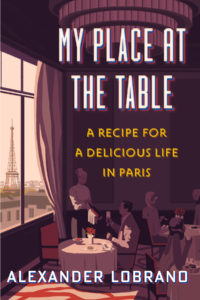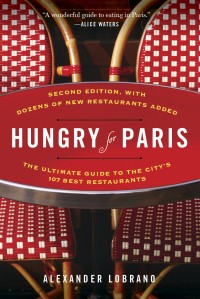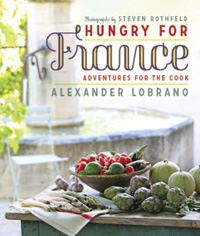A Bona Fide Bistro and A Promising Newcomer: La Cave Beauvau, A-; La Fouchette du Printemps, B+
Staring out at the fog shrouding the runways in Zurich airport, I just realized that I’d been daydreaming about the dinner that I had last night at La Cave Beavau for the last twenty minutes. Why? It was a meal that nourished me in all senses of the word, and it also touched the pithe of what I most love about not only Paris, but also French food.
And to think I’d probably walked by this place in the rue des Saussies just across the street from Chez Sarko, or the Elysees Palace, dozens of times during the twenty years I’ve lived in Paris without giving it a second thought. On the other hand, Stephane Delleré, one of the greatest bistro keepers in the city, has only been the owner for a few months. Delleré, whom I admire to no end, previously ran Le Gavroche, which he still owns, and Le Duc de Richelieu near the Gare de Lyon, which he’s sold, and originally from La Sarthe, he’s worked in almost every type of restaurant job you can imagine, which is one major reason why his places are always so heart-warmingly good. The other, of course, is that he insists on serving only the very best of everything—his beef comes from La Bourcherie Premiere, he buys his wines from flock of independent vigneron friends, and everything else aside from the cheese is homemade. As crucial as Delleré experience and commitment to quality maybe, however, the real reason his restaurants are so remarkable is that he has a real vocation for making other people happy.
It helps, too, that La Cave Beavau has the delicious atmosphere created by an almost untouched 1950s Parisian bistro interior, including the wonderful violin-shaped swirls on the ceiling that made me think of a set for Cocteau’s “Orphee,” a bank of old-fashion under-counter refrigerators behind the long bar in the entry, and various other vintage bits and pieces, including cash registers and telephones from several different long ago decades. Of course no one designed this look, however, and of course this is why it’s so wonderful, guilessly sincere and haphazardly authentic.
Bruno and I met two friends at the bar and we sipped a terrific white wine from La Touraine and, thanks to Delleré, ate more hors d’oeuvres than we should have before sitting down to dinner. But I couldn’t stop myself, and neither could Bruno or Ann or Maggie. So Stephane kept slicing more delicious Serrano ham and refilling a small plate of bulots (sea snails) poached in a good court bouillon everytime we emptied same.
Finally we sat at a cosy booth table in the backroom and ordered a round of profoundly Gallic and profoundly delicious starters—oeufs mayonnaise (hard-boiled eggs in ivory-colored homemade
mayonnaise); jambon persille, that Burgundian classic of shredded ham in parslied aspic; and two superb terrines—chicken liver and duck, both of which were homemade, which explained their perfect coarse texture. Next, an impeccable steak tartare with homemade frites, a pave de rumsteak with pepper cream sauce, an andouillette AAAAA and a daily special of sautéed scallops with fresh vegetables, all excellent. And finally, baba au rhum and Saint Marcellin cheese, which we all shared. Delleré has also put together a superb wine list, including many excellent Beaujolais—Saint Amour, Julienas, Chenas, etc., along with remarkable bottles of Crozes Hermitage and Cornas. La Cave Beauvau is a truly precious address for anyone who really loves authentic, moderately priced old-fashioned bistros.
————
Though not easy to get to, the northern edges of the 17th arrondissement continue to be the setting for a variety of the city’s best new contemporary bistros (Hier et Aujourd’hui, L’Entredgeu), and the latest candidate is the very good new La Fourchette du Printemps, a simple storefront place just across the train cut of the defunct circular railway known as La Petite Ceinture.
It’s a very simple, sincere and reasonably priced place with white walls, oak tables, aluminum hanging lamps a la IKEA, and comfortable scarlet-upholstered chairs, and I stopped in to sample one of the excellent good-value lunch menus (18 Euros to 30 Euros) prepared by two amiable young men who trained at a suite of star-studded tables before going out on their own. We started with a complimentary hors d’oeuvre of delicious creamy parsnip soup, and then sampled an excellent old-fashioned potage Dubarry (cream of cauliflower soup) that had been made with an excellent, full-flavored bouillon and a delicious terrine with a rich lobe of foie gras and a delicate wrapping of fine ribbons of poached leek. Next, a perfectly cooked cod steak with a sauté of autumn vegetables for my friend, and a carefully cooked supreme de volaille (chicken breast) on a bed of very good risotto for me. We finished with simple but very good desserts—meringue with orange slices and a deconstructed tarte Tatin that was less successful; instead of baked apple, cinammon-flavored crumbs and cream in a dreaded verrine (stout glass), I’d have preferred the real McCoy. Still, this very pleasant restaurant offers very good food at very reasonable prices, and I’ll definitely go back to sample the Waterzoi de la Mer on the dinner menu.
La Cave Beauvau, 4, Rue des Saussaies, 8th, Tél: 01-42-65-24-90. Metro: Miromesnil or Champs-Élysées – Clemenceau. Open Monday-Saturday, 7am-8pm, and Wednesday, Friday and Saturday for dinner. Average 35 Euros.
La Fourchette du Printemps, 30 rue du Printemps, 17th, Tel. 01-42-27-26-97. Metro: Wagram. Closed Saturday lunch and Sunday. Lunch menus 18 – 30 Euros, Dinner 42 Euros.




